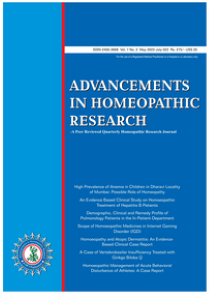An Experimental Study to Assess the Scope of Homoeopathy in Obesity of Children, with its Homoeopathic Management
DOI:
https://doi.org/10.48165/ahr.2024.9.3.7Keywords:
Body mass index, Obesity, HomoeopathyAbstract
BACKGROUND-Obesity is one of the greatest public health challenges worldwide. Now a days it is more common in children also. It is not only a medical but also a philosophical, ecological, economic, sociocultural, and psychological problem as well as a severe consequence of our modern value definition to 'receive more and more'. Therefore, physicians are not able to treat obesity broadly and should not be used any tools to achieve certain weight goals. Homoeopathic literatures speak volumes of treatment of such cases.
References
1. Rome ES. Obesity prevention and treatment. Pediatr Rev.2021;32:363–372. doi: 10.1542/pir.32-9-363. quiz 373. [PubMed] [CrossRef] [Google Scholar]
2. Ebbeling CB, Pawlak DB, Ludwig DS. Childhood obesity: Public-health crisis, common sense cure. Lancet. 2002;360:473–482. doi: 10.1016/S0140- 6736(02)09678-2. [PubMed] [CrossRef] [Google Scholar]
3. Daniels SR, Arnett DK, Eckel RH, et al. Overweight in children and adolescents: pathophysiology, consequences, prevention, and treatment. Circulation. 2005;111:19–202. doi: 10.1161/01.
CIR.0000161369.71722.10. [PubMed] [CrossRef] [Google Scholar]
4. Childhood Obesity: Assessment, Prevention & Treatment. Childhood Obesity: Overview. 2022 [Google Scholar]
5. Centers for Disease Control and Prevention: BMI guidelines with links to the growth charts .cdc. gov/nccdphp/dnpa/bmi/bmi-for-age.html. [Google Scholar]
6. Centers for Disease Control and Prevention,National Center for Health Statistics,BMI-for-agegrowth charts: https://www.cdc.gov/healthyweight/ assessing/bmi/childrens_bmi/about_childrens_bmi.
html
7. Rettner R. Obesity: causes, complications and treatment. Live Sc. 2023 Apr 03; [Google Scholar]
8. Nowicka P, Flodmark CE. Family in pediatric obesity management: a literature review. Int J PediatrObes. 2008;3(Suppl 1):44–50. doi: 10.1080/17477160801896994. [PubMed] [CrossRef] [Google Scholar]
9. Srinivasan SR, Myers L, Berenson GS. Predictability of childhood adiposity and insulin for developing insulin resistance syndrome (syndrome X) in young adulthood: the Bogalusa Heart Study. Diabetes. 202;51:204–209. doi: 10.2337/diabetes.51.1.204. [PubMed] [CrossRef] [Google Scholar]
10. Sinha R, Fisch G, Teague B, Tamborlane WV, Banyas B, Allen K, Savoye M, Rieger V, Taksali S, Barbetta G, et al. Prevalence of impaired glucose tolerance
among children and adolescents with marked obesity. N Engl J Med. 202;346:802–810. doi: 10.1056/NEJMoa012578. [PubMed] [CrossRef] [Google Scholar]
11. Redline S, Tishler PV, Schluchter M, Aylor J, Clark K, Graham G. Risk factors for sleep-disordered breathing in children. associations with obesity, race, and respiratory problems. Am J Respir Crit Care Med. 199;159:1527–1532. doi: 10.1164/ ajrccm.159.5.9809079. [PubMed] [CrossRef] [Google Scholar]
12. Lustig RH, Rose SR, Burghen GA, Velasquez Mieyer P, Broome DC, Smith K, Li H, Hudson MM, Heideman RL, Kun LE. Hypothalamic obesity caused by cranial insult in children: Altered glucose and insulin dynamics and reversal by a somatostatin agonist. J Pediatr. 199;135:162–168. doi: 10.1016/
S0022-3476(99)70017-X. [PubMed] [CrossRef] [Google Scholar]
13. Yanovski JA. Intensive therapies for pediatric obesity. Pediatr Clin North Am. 201;48:1041–1053. doi: 10.1016/S0031-3955(05)70356-4. [PubMed] [CrossRef] [Google Scholar]
14. SINGH M, peadiatric clinical methods, 3rd edition, sagar publication 2005. Page 1' to 324.
15. Hampl SE, Hassink SG, Skinner AC, et al. Clinical practice guideline for the evaluation and treatment of children and adolescents with obesity.Pediatrics2023 Feb 1;151(2):e2022060640. https://doi.org/10.1542/ peds.2022-060640
16. HAHNEMANN, SAMUEL, Organon Of Medicine, fifth edition, Jain publisher, New Delhi 10055




